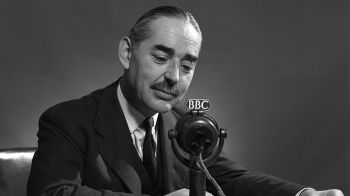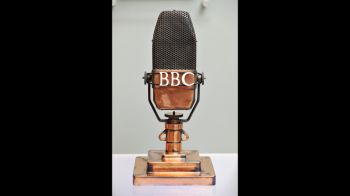Sussex team reveals the BBC’s role in secret military activities during World War Two
By: MARGARET Ousby
Last updated: Monday, 24 February 2020

BBC newsreader John Snagge

BBC radio had an important role in WW2
On the 80th anniversary of the start of World War Two, the latest phase of a collaboration between the University of Sussex and the BBC is published online today at The BBC and World War Two, 100 voices.
A team of experts from the University of Sussex School of Media Film and Music worked with BBC History to compile a new archive of BBC interviews and documents that reveals the corporation’s role in secret military activities during World War Two as part of the Connected Histories of the BBC project.
David Hendy, curator of the collection and Professor of Media and Cultural History at the University of Sussex, said:
“This new archive release for the BBC’s oral history collection is a really important piece of social history, giving us intriguing and - until now – entirely unheard ‘inside’ accounts of the BBC’s wartime role. It also confirms for the first time several fascinating details of BBC’s role in wartime activities and as a morale-booster in the fight against fascism, along with interviews and documents about events and programmes that remain a huge part of the popular memory of World War Two.”
The Sussex team also includes Dr Alban Webb, who co-wrote and co-curated the website with Professor Hendy, Professor Margaretta Jolly, Professor Tim Hitchcock, Dr Anna-Maria Sichani and Denise Penrose.
Lyse Doucet, the BBC’s Chief International Correspondent, said
“No matter whether the wars you are covering are really complex and really consequential, when you drill down, what it’s really about are mothers and fathers, and children and neighbours, and streets and societies. The human side of the war is really what is the essence of war, because war is life or death. Humanity is a thread that you see all the way through this archive. Even though the reporters had to be neutral, they found a way to put a little humanity in it, because, in the end, this is all about lives - you and I. You have to try to be as humane as possible even through one of the most inhumane moments of human history”.
The collection includes:
- Details of an operation to replace the live Big Ben chimes with a recorded version in the event of an air attack, to ensure the Germans did not know their planes were over Westminster.
- An insight into the secret process of playing certain music at the end of news bulletins – the choice of records giving orders or information to resistance groups in Poland.
- Eye-witness accounts from people inside Broadcasting House during attacks in October and December 1940, revealing the chaos and confusion and how the BBC kept programmes on the air
- Inside accounts of life under siege at the BBC during the Blitz and the camaraderie of 400 staff sleeping every night in the basement of Broadcasting House.
- The fullest inside account yet of how the BBC told the world about D-Day. Newsreader John Snagge describes the hours running up to his announcement, when he was locked under armed guard to stop news sneaking out.
The new The BBC and World War Two, 100 voices website is one in a series made as part of Connected Histories of the BBC – a project led by the University of Sussex in partnership with the BBC, Mass Observation, the Science Museum Group and the British Entertainment History project. The project is funded by the Arts and Humanities Research Council.
